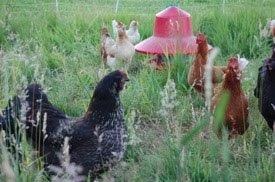Misty Meadows Farms

| Rating |      |
| Farm/Brand Headquarters | Everson, WA |
| Website | https://mistymeadowsfarm.com/ |
| Market Area | WA |
| Total Score | 1635 |
They write: “Misty Meadows Farm is a small family farm wanting to raise the very best food we can for our own table and for our friends and neighbors. We are certified organic and seek in all ways to treat the land and the animals in ways that are respectful, healthy and sustainable. We began in 2005 with three pet hens and now have a flock of over 750 laying hens. Our eggs can be found at locally owned grocery stores and restaurants throughout Bellingham, WA.”
“All of our poultry are pasture raised. Our birds have continuous access to grass and fresh air. We rotate the birds around our 18 acre property providing a year-round supply of fresh pasture. Our birds have open air coops that protect them from severe weather, but they are never confined. In 2007, our eggs were tested by a nutritional testing lab as part of a nationwide study sponsored by Mother Earth News magazine. Misty Meadows Farm eggs had three times the vitamin E, four times the heart healthy Omega 3s, a third less cholesterol, and a third less saturated fat than eggs from factory farmed birds.”
| Criteria | Points | Comment |
|---|---|---|
| TOTAL (possible score is 1700) | 1635 | 5-egg      |
|
Brands that have close daily control over their egg production receive the most points. Ownership Structure | 100 | Single farm |
|
Brands that only produce organic products make the biggest investments — in time and money — in systems that benefit us all. Eggs sourced from a single operation receive the most points. Eggs of unclear origins and/or with poor oversight receives the fewest points. Commitment to Organic Label | 100 | Highly committed to organic label |
|
Additional certifications, depending on the credibility of the label, can demonstrate a commitment beyond the organic standards. Other Labels and Standards | 100 | Real Organic Project, Animal Welfare Approved |
|
Smaller flock sizes (the number of laying hens per housing structure) offer better animal welfare conditions. Flock Size(s) | 100 | Very small flocks of 50 birds per mobile house |
|
The best housing offers space for natural behaviors and legitimate access to the outdoors through adequate exits. Hen Housing and Exit Areas | 85 | Fixed housing with rotated pasture, vegetation is maintained |
|
Adequate indoor spacing reduces stress and disease. With less crowding, birds can stretch their wings and more easily perform other natural behaviors. Indoor Spacing | 100 | 2 square feet per bird; hens have ample room to perform natural behaviors year round |
|
High scoring brands provide enough space to allow each hen to fully utilize their outdoor area, and to perform instinctive behaviors without harming the environment. Outdoor Spacing | 100 | 127 square feet per bird; hens have ample room to perform natural behaviors |
|
High quality outdoor access includes vegetation, soil, and ample opportunities to forage year-round. Quality of Outdoor Access | 100 | Excellent outdoor access quality with access to the outdoors even during winter weather, maintain 100% vegetation with rotation |
|
Birds that are introduced to the outdoors early are more accustomed to spending time outdoors without fear or stress. Outdoor Access Timing | 100 | Introduced to outdoors at 6 weeks |
|
Year-round access to perches, scratching areas, deep litter, novel foodstuffs, and dust bathing contribute to quality of life. Enrichments | 100 | Enrichments are provided along with legitimate outdoor access |
|
Chickens use their beaks to interact with the world. Authentic organic farmers account for this behavior, eschewing beak trimming. Alterations | 100 | No beak trimming or forced molting allowed |
|
Raising chicks on farm or buying them from certified organic hatcheries shows dedication to organic production from start to finish. Chicks and Pullets | 100 | Brand purchases certified organic chicks to raise on-site |
|
Brands that have low rates of deaths and utilize their spent hens for human consumption or similar score the highest. Deaths, Culls, and Spent Hens | 90 | Death rate below 5%, spent hens sold live |
|
Brands that closely monitor and manage health of soil, native species, and water quality receive the most points. Environmental Impacts | 90 | Diversified farm, manure used as on-farm fertility and sold, steps taken for environmental sustainability |
| Feed Sourcing | 80 | Obtains feed from organic supplier that distributes locally |
|
Brands that score well here go above and beyond to ensure the highest animal welfare, taking into consideration their hens’ safety and cleanliness, natural behavior, and stress levels. Animal Welfare | 90 | Excellent animal welfare |
|
Cornucopia believes you have a right to transparency. Top brands share information with Cornucopia via a survey and cooperate with our own independent investigations. Transparency | 100 | Full transparency |
|
Brands do not receive points, but this information is offered for people with soy and/or gluten allergies. Soy free and/or gluten free? | Not soy or gluten free | |
|
Brands do not receive points, but are invited to submit the name of their Accredited Organic Certifier (suppliers may have different certifiers). Organic Certifier (non-scoring) | WSDA | |
|
Extra credit is offered for various practices that go above-and-beyond in some form. Extra Credit | 0 | None |

